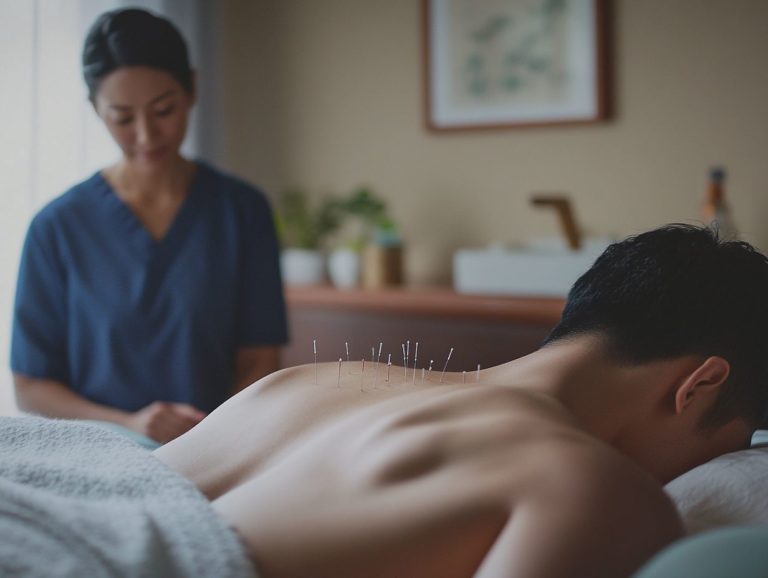Acupuncture and Its Effect on Blood Pressure
Acupuncture, an ancient practice deeply rooted in Chinese medicine, has garnered considerable attention for its potential in managing blood pressure.
This article delves into the rich history and foundational principles of acupuncture. It illuminates how it interacts with your body to influence blood pressure levels. You ll discover recent research findings that showcase its benefits in reducing hypertension and related conditions, along with a discussion on important risks and precautions to consider.
You will gain insights into how to effectively incorporate acupuncture into your treatment plan, promoting a holistic approach to health. Join us as we discover the fascinating connection between acupuncture and blood pressure management.
Contents
- Key Takeaways:
- Understanding Acupuncture
- How Acupuncture Affects Blood Pressure
- Benefits of Acupuncture for Blood Pressure
- Risks and Side Effects
- Incorporating Acupuncture into Treatment Plans
- Frequently Asked Questions
- What is acupuncture and how does it affect blood pressure?
- How often should one undergo acupuncture treatment for blood pressure regulation?
- Can acupuncture be used as a standalone treatment for high blood pressure?
- Are there any risks or side effects associated with acupuncture for blood pressure control?
- Can acupuncture help with other health conditions besides regulating blood pressure?
- Is there any scientific evidence to support the use of acupuncture for blood pressure regulation?
Key Takeaways:

Acupuncture can positively impact blood pressure.
Research shows it helps reduce hypertension, making it a valuable part of treatment plans.
Always consult a qualified practitioner. Combining acupuncture with traditional medicine may yield better results.
Understanding Acupuncture
Grasping the essence of acupuncture invites you to explore its historical roots and foundational principles that define this ancient practice.
Emerging from the traditions of Chinese medicine, acupuncture involves the precise insertion of fine needles into specific acupoints along pathways in the body. These pathways are thought to influence the flow of life energy.
This holistic approach is designed to restore balance and enhance overall well-being. It effectively addresses a range of health concerns, from hypertension to chronic stress.
History and Principles
The history of acupuncture stretches back thousands of years, deeply rooted in traditional Chinese medicine. This ancient healing art dates as far back as 100 BCE and is often discussed in pivotal texts such as the “Huangdi Neijing” or “The Yellow Emperor’s Inner Canon,” which established key theories and methodologies.
Over the centuries, acupuncture has evolved significantly, adapting to various cultures and seamlessly integrating into modern medical practices. At the heart of its philosophy is the concept of meridians pathways that channel vital energy, known as life energy, throughout the body.
By stimulating specific points along these meridians with fine needles, practitioners strive to harmonize bodily functions, enhance vitality, and promote overall health. This illustrates a remarkable interplay between ancient wisdom and contemporary wellness approaches, inviting you to explore the timeless benefits of this age-old practice.
How Acupuncture Affects Blood Pressure
Recent studies suggest that acupuncture can beneficially impact blood pressure, especially for those dealing with hypertension.
Research from randomized controlled trials highlights its effectiveness in managing both systolic and diastolic blood pressure, thereby reducing the risk of cardiovascular disease.
This therapeutic approach seems to engage the autonomic nervous system, aiding in the restoration of balance for individuals grappling with chronic stress and elevated blood pressure.
Research and Studies

Numerous clinical studies have explored the effectiveness of acupuncture in managing hypertension and related health issues. Among these, randomized controlled trials (RCTs) have become essential for validating acupuncture’s impact, providing a robust framework for comparison against sham acupuncture.
For example, a systematic review published in the Journal of Hypertension evaluated multiple RCTs and discovered that participants receiving authentic acupuncture experienced significant reductions in blood pressure compared to those receiving sham treatments.
These studies utilized rigorous methodologies, including blinding and proper randomization, ensuring that the benefits attributed to acupuncture were not simply the result of placebos.
The health outcomes measured included more than just blood pressure levels; they also encompassed anxiety relief and improvements in overall quality of life. This highlights acupuncture’s potential as a comprehensive approach to managing hypertension.
Benefits of Acupuncture for Blood Pressure
Acupuncture presents a wealth of advantages for those navigating the challenges of high blood pressure. It serves as an effective complementary therapy for reducing hypertension.
By fostering relaxation and precisely targeting specific acupoints, this ancient practice can elicit beneficial physiological responses. It not only lowers the risk of cardiovascular events but also enhances your overall well-being.
Reducing Hypertension and Related Conditions
The practice of acupuncture has been linked to a reduction in hypertension and the alleviation of related conditions. This whole-body approach enhances cardiovascular health.
Practitioners focus on specific points throughout the body to restore balance and promote relaxation. These key elements are crucial for effectively managing high blood pressure.
Research indicates that individuals who engage in regular acupuncture sessions experience noteworthy decreases in both systolic and diastolic measurements. For instance, one case study featured a patient grappling with chronic stress and elevated blood pressure. They reported remarkable improvements following a series of treatments.
This method not only contributed to lowering their blood pressure but also provided vital relief from daily stressors. It underscores the intricate connection between mental and physical health concerning cardiovascular issues.
Risks and Side Effects
While acupuncture is widely regarded as safe, recognize the potential risks and side effects that can accompany this practice. Adverse events are relatively uncommon, but their occurrence highlights the importance of ethical approval in clinical settings.
Establishing treatment and control groups is crucial for your safety as a patient.
Potential Risks and Precautions

Acupuncture offers numerous benefits, but it also carries certain risks and potential side effects to be aware of. You might experience mild soreness at the insertion site or occasional bruising. In rare cases, more serious effects like infections or punctured organs can occur if the procedure isn t performed correctly.
That s why it s crucial to prioritize safety by seeking treatment exclusively from licensed and accredited practitioners. This not only upholds ethical standards but also significantly reduces the likelihood of complications.
Before undergoing acupuncture therapy, don’t wait consult with a licensed practitioner. Discuss your medical history, current conditions, and any concerns you may have. This allows the practitioner to tailor the treatment to your specific needs, ensuring a safe and effective experience.
Incorporating Acupuncture into Treatment Plans
Integrating acupuncture into your treatment plans can significantly elevate patient care, particularly when it complements traditional medicine strategies. This whole-body approach targets specific health issues, like hypertension, while fostering overall well-being within a comprehensive healthcare model.
By embracing this integration, you provide a more nuanced and effective pathway to health for your patients.
Combining with Traditional Medicine
Combining acupuncture with traditional medicine creates a powerful synergy in managing hypertension and related health concerns. This holistic method addresses not only the physical symptoms but also emphasizes your emotional well-being.
For example, if you’re dealing with hypertension, you might also experience anxiety. This can be alleviated through acupuncture sessions that encourage relaxation and stress relief.
One case study showcased a patient whose blood pressure dropped significantly after incorporating acupuncture alongside standard antihypertensive medications. This patient reported better sleep quality and reduced stress levels, contributing to a more effective overall treatment plan.
By integrating acupuncture, traditional medicine boosts its effectiveness and enhances patient satisfaction and overall quality of life.
Consulting with a Qualified Practitioner
Consulting with a qualified practitioner is crucial for safe and effective acupuncture treatment tailored to your individual needs.
A qualified practitioner brings formal education and ongoing training in acupuncture. They stay updated on evolving standards and regulations.
They typically hold relevant certifications and licenses, showing their competence and commitment to high-quality patient care.
Focusing on your safety, these professionals conduct thorough assessments before creating personalized treatment plans. This approach is essential to address your health concerns and goals.
Personalized treatments not only enhance effectiveness but also build trust. This leads to better health outcomes and a more satisfying experience for you as a patient.
Frequently Asked Questions

What is acupuncture and how does it affect blood pressure?
Acupuncture is a traditional Chinese medicine practice that uses thin needles at specific points on the body. Studies show it can help lower blood pressure by stimulating the nervous system and releasing neurotransmitters, which are chemicals that send signals in the brain.
How often should one undergo acupuncture treatment for blood pressure regulation?
The frequency of treatment varies based on individual needs and condition severity. Some people benefit from weekly sessions, while others may only need monthly visits to maintain blood pressure levels.
Can acupuncture be used as a standalone treatment for high blood pressure?
Yes, acupuncture can be used alone for high blood pressure. However, it s often recommended alongside lifestyle changes like a healthy diet, regular exercise, and medication if prescribed.
Are there any risks or side effects associated with acupuncture for blood pressure control?
Acupuncture is generally safe, but potential risks and side effects exist. These may include bruising, soreness, or bleeding at the needle site and possible interactions with certain medications. Always discuss these with your licensed acupuncturist.
Can acupuncture help with other health conditions besides regulating blood pressure?
Absolutely! Acupuncture treats various health conditions, including chronic pain, digestive issues, and stress-related disorders. It also promotes overall well-being and relaxation.
Is there any scientific evidence to support the use of acupuncture for blood pressure regulation?
While more research is needed, several studies show promising results for acupuncture in regulating blood pressure. Some studies even find it as effective as certain medications. Always consult a healthcare professional before using acupuncture for blood pressure control!






